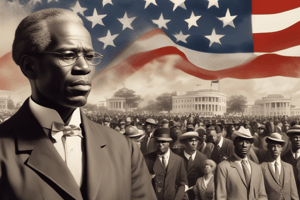Podcast
Questions and Answers
What role did President Johnson's Reconstruction Plan play in the overall Reconstruction effort?
What role did President Johnson's Reconstruction Plan play in the overall Reconstruction effort?
- It provided federal funding for the rebuilding of Southern infrastructure.
- It sought to reunify the nation and allow Southern states to rejoin the Union swiftly. (correct)
- It required Southern states to adopt new constitutions that guaranteed civil rights.
- It aimed to grant full voting rights immediately to all former slaves.
Which amendment is primarily associated with granting citizenship and equal protection under the law to all persons born or naturalized in the United States?
Which amendment is primarily associated with granting citizenship and equal protection under the law to all persons born or naturalized in the United States?
- Nineteenth Amendment
- Thirteenth Amendment
- Fourteenth Amendment (correct)
- Fifteenth Amendment
What was a significant consequence of the return of pre-war Southern leadership after the Civil War?
What was a significant consequence of the return of pre-war Southern leadership after the Civil War?
- It resulted in the establishment of the Ku Klux Klan. (correct)
- It ensured the passage of the Thirteenth Amendment.
- It facilitated the inclusion of African Americans in Congress.
- It led to greater political power for Northern Republicans.
What best describes the impact of Reconstruction on African Americans in the South as it came to an end?
What best describes the impact of Reconstruction on African Americans in the South as it came to an end?
During Reconstruction, which legislative act was designed to prevent states from denying voting rights based on race?
During Reconstruction, which legislative act was designed to prevent states from denying voting rights based on race?
President Johnson's Reconstruction Plan aimed to strengthen the rights of African Americans.
President Johnson's Reconstruction Plan aimed to strengthen the rights of African Americans.
The Fourteenth Amendment was designed to grant citizenship and equal protection under the law.
The Fourteenth Amendment was designed to grant citizenship and equal protection under the law.
The Ku Klux Klan emerged during Reconstruction to promote racial equality.
The Ku Klux Klan emerged during Reconstruction to promote racial equality.
Reconstruction ended without significant progress made for African Americans in the South.
Reconstruction ended without significant progress made for African Americans in the South.
The return of pre-war southern leadership led to increased control by Republicans in Congress.
The return of pre-war southern leadership led to increased control by Republicans in Congress.
President Johnson's Reconstruction Plan was widely accepted by all Congress members.
President Johnson's Reconstruction Plan was widely accepted by all Congress members.
The Fourteenth Amendment granted voting rights specifically to all African American males.
The Fourteenth Amendment granted voting rights specifically to all African American males.
The Ku Klux Klan was formed during Reconstruction to intimidate and suppress African American political participation.
The Ku Klux Klan was formed during Reconstruction to intimidate and suppress African American political participation.
Reconstruction efforts faced numerous challenges, especially regarding the integration of African Americans into Southern society.
Reconstruction efforts faced numerous challenges, especially regarding the integration of African Americans into Southern society.
Rebuilding Southern industry saw immediate success without any obstacles following the Civil War.
Rebuilding Southern industry saw immediate success without any obstacles following the Civil War.
Flashcards are hidden until you start studying
Study Notes
Reconstruction Overview
- Reconstruction aimed to rebuild the Union post-Civil War, addressing political, social, and economic issues in the South.
- The process was marked by struggles over political power and civil rights for African Americans.
Rebuilding the South
- Reconstruction commenced with challenges such as infrastructure damage and economic instability.
- The transition from slavery to freedom for African Americans involved legal and social transformations.
Freedom for African Americans
- Emancipation led to significant changes in the status of African Americans, striving for equality and civil rights.
- Freedmen sought opportunities in education, employment, and land ownership, facing a hostile environment.
President Johnson's Reconstruction Plan
- Johnson's approach favored leniency and rapid reintegration of Southern states without stringent safeguards for African American rights.
- His policies drew criticism for allowing former Confederates to reclaim political power.
Fight Over Reconstruction
- The emergence of former Confederates in power prompted conflict with the Republican-led Congress, which sought stronger measures.
- Johnson faced significant opposition from Congress, leading to his impeachment but ultimately acquittal.
Fourteenth Amendment
- Ratified in 1868, it granted citizenship to all persons born or naturalized in the U.S. and guaranteed equal protection under the law.
- Aimed to protect the rights of African Americans and curb the influence of Southern Democrats.
Congress Takes Control of Reconstruction
- Congressional Reconstruction imposed stricter requirements for Southern states to rejoin the Union, including military oversight.
- Republicans enacted legislation ensuring civil rights and protections for African Americans amid Southern resistance.
Fifteenth Amendment
- Ratified in 1870, it prohibited denying voting rights based on race, color, or previous servitude.
- Symbolized a major advancement in civil rights, despite ongoing disenfranchisement tactics in the South.
Reconstruction in the South
- Reconstruction governments were established, often facing challenges from insurgent groups and economic hardships.
- The Ku Klux Klan emerged to intimidate and suppress African American political participation and social mobility.
Reconstruction Ends
- By the late 1870s, federal support for Reconstruction dwindled, leading to the withdrawal of troops and the end of military governance in the South.
- This marked the resurgence of white supremacist policies and institutions, undermining gains made during Reconstruction.
Rebuilding Southern Industry
- The South attempted to diversify its economy from agriculture to industry, though progress was limited by economic conditions and social resistance.
Reconstruction in the North
- Northern states witnessed their own struggles with integrating returning soldiers and addressing civil rights post-war.
- The broader implications of Reconstruction efforts influenced national politics and civil rights debates beyond the South.
Reconstruction Overview
- Reconstruction aimed to rebuild the Union post-Civil War, addressing political, social, and economic issues in the South.
- The process was marked by struggles over political power and civil rights for African Americans.
Rebuilding the South
- Reconstruction commenced with challenges such as infrastructure damage and economic instability.
- The transition from slavery to freedom for African Americans involved legal and social transformations.
Freedom for African Americans
- Emancipation led to significant changes in the status of African Americans, striving for equality and civil rights.
- Freedmen sought opportunities in education, employment, and land ownership, facing a hostile environment.
President Johnson's Reconstruction Plan
- Johnson's approach favored leniency and rapid reintegration of Southern states without stringent safeguards for African American rights.
- His policies drew criticism for allowing former Confederates to reclaim political power.
Fight Over Reconstruction
- The emergence of former Confederates in power prompted conflict with the Republican-led Congress, which sought stronger measures.
- Johnson faced significant opposition from Congress, leading to his impeachment but ultimately acquittal.
Fourteenth Amendment
- Ratified in 1868, it granted citizenship to all persons born or naturalized in the U.S. and guaranteed equal protection under the law.
- Aimed to protect the rights of African Americans and curb the influence of Southern Democrats.
Congress Takes Control of Reconstruction
- Congressional Reconstruction imposed stricter requirements for Southern states to rejoin the Union, including military oversight.
- Republicans enacted legislation ensuring civil rights and protections for African Americans amid Southern resistance.
Fifteenth Amendment
- Ratified in 1870, it prohibited denying voting rights based on race, color, or previous servitude.
- Symbolized a major advancement in civil rights, despite ongoing disenfranchisement tactics in the South.
Reconstruction in the South
- Reconstruction governments were established, often facing challenges from insurgent groups and economic hardships.
- The Ku Klux Klan emerged to intimidate and suppress African American political participation and social mobility.
Reconstruction Ends
- By the late 1870s, federal support for Reconstruction dwindled, leading to the withdrawal of troops and the end of military governance in the South.
- This marked the resurgence of white supremacist policies and institutions, undermining gains made during Reconstruction.
Rebuilding Southern Industry
- The South attempted to diversify its economy from agriculture to industry, though progress was limited by economic conditions and social resistance.
Reconstruction in the North
- Northern states witnessed their own struggles with integrating returning soldiers and addressing civil rights post-war.
- The broader implications of Reconstruction efforts influenced national politics and civil rights debates beyond the South.
Reconstruction Overview
- Reconstruction aimed to rebuild the Union post-Civil War, addressing political, social, and economic issues in the South.
- The process was marked by struggles over political power and civil rights for African Americans.
Rebuilding the South
- Reconstruction commenced with challenges such as infrastructure damage and economic instability.
- The transition from slavery to freedom for African Americans involved legal and social transformations.
Freedom for African Americans
- Emancipation led to significant changes in the status of African Americans, striving for equality and civil rights.
- Freedmen sought opportunities in education, employment, and land ownership, facing a hostile environment.
President Johnson's Reconstruction Plan
- Johnson's approach favored leniency and rapid reintegration of Southern states without stringent safeguards for African American rights.
- His policies drew criticism for allowing former Confederates to reclaim political power.
Fight Over Reconstruction
- The emergence of former Confederates in power prompted conflict with the Republican-led Congress, which sought stronger measures.
- Johnson faced significant opposition from Congress, leading to his impeachment but ultimately acquittal.
Fourteenth Amendment
- Ratified in 1868, it granted citizenship to all persons born or naturalized in the U.S. and guaranteed equal protection under the law.
- Aimed to protect the rights of African Americans and curb the influence of Southern Democrats.
Congress Takes Control of Reconstruction
- Congressional Reconstruction imposed stricter requirements for Southern states to rejoin the Union, including military oversight.
- Republicans enacted legislation ensuring civil rights and protections for African Americans amid Southern resistance.
Fifteenth Amendment
- Ratified in 1870, it prohibited denying voting rights based on race, color, or previous servitude.
- Symbolized a major advancement in civil rights, despite ongoing disenfranchisement tactics in the South.
Reconstruction in the South
- Reconstruction governments were established, often facing challenges from insurgent groups and economic hardships.
- The Ku Klux Klan emerged to intimidate and suppress African American political participation and social mobility.
Reconstruction Ends
- By the late 1870s, federal support for Reconstruction dwindled, leading to the withdrawal of troops and the end of military governance in the South.
- This marked the resurgence of white supremacist policies and institutions, undermining gains made during Reconstruction.
Rebuilding Southern Industry
- The South attempted to diversify its economy from agriculture to industry, though progress was limited by economic conditions and social resistance.
Reconstruction in the North
- Northern states witnessed their own struggles with integrating returning soldiers and addressing civil rights post-war.
- The broader implications of Reconstruction efforts influenced national politics and civil rights debates beyond the South.
Studying That Suits You
Use AI to generate personalized quizzes and flashcards to suit your learning preferences.




